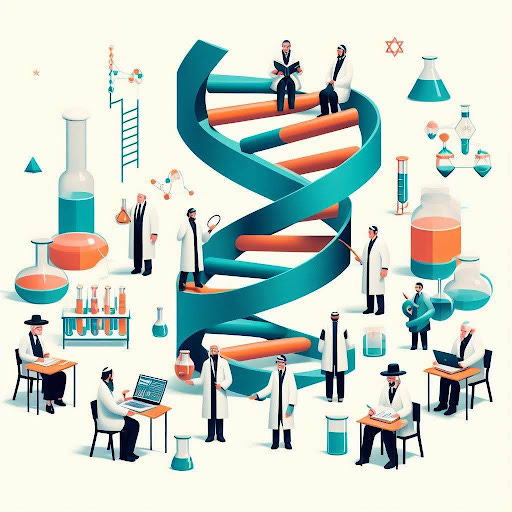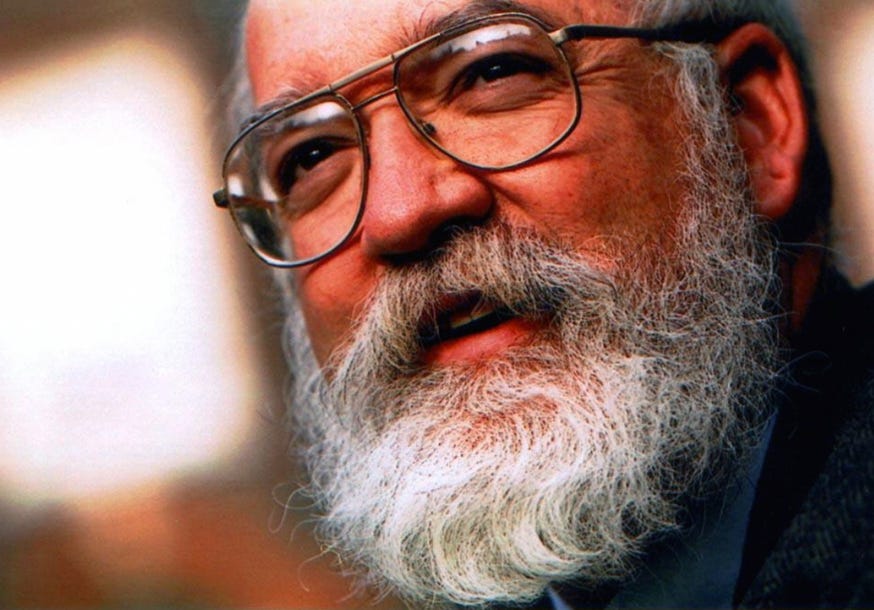Repronews #29: Over 2/3 of Americans want to expand insurance coverage for IVF
Judaism & gene editing; cloning to save endangered species; delayed gratification & academic success; remembering Daniel Dennett
Welcome to the latest issue of Repronews! We’ll be taking a break for a few weeks as we pause for the Easter holidays. I hope the now over 600 subscribers of this newsletter will not be disappointed.
While we’ll mostly be travelling for leisure—east coast of the USA—I’ll also be meeting with some people working in reprotech policy and advocacy. Don’t hesitate to reach out if you want to meet up in person or online. See you soon!
Craig
* * *
Highlights from this week’s edition:
Repro/genetics
Poll: over two-thirds of Americans want to expand insurance coverage for IVF
A Jewish religious perspective on gene editing
Further Learning
Conservationists have cloned black-footed ferrets to save the species and strengthen its genetic diversity
Singapore study finds children better at delaying gratification are more likely to do well academic and have fewer behavioral problems
Remembering Daniel Dennett: some quotes from the American philosopher of science and biology
Repro/genetics
“Survey shows strong support for increased access to fertility treatments” (ASRM)
A new U.S. poll reveals strong support for improved access to IVF.
Asked whether health insurance plans should be required to offer IVF coverage, 67% of respondents agreed. 26% neither supported nor opposed, while only 7% opposed such a requirement.
Similarly, 71% supported the federal government offering IVF coverage to its military and civilian employees and only 7% expressed opposition.
Many Americans, including military service members and veterans, lack insurance coverage for IVF care.
“Clearly, a large majority of Americans think insurance companies ought to do the right thing and offer IVF coverage,” said Dr. Paula Amato, President of the American Society for Reproductive Medicine (ASRM). “And they clearly support the government requiring them to do it if they won’t do it on their own. … As so many members of Congress have expressed their support for IVF over the last few months, we call upon them to do more than offer words.”
“Judaism and gene editing: Should we be playing God?” (The Roar)
The article outlines recent developments in CRISPR gene editing, including genetic therapies, and analyzes them from a Jewish religious perspective.
For now, it is illegal to genetically engineer sperm, egg, or embryonic cells in the United States, as these changes would affect every cell in the patients’ body and could potentially be passed down from parent to child.
Officials fear that if this technology fell into the wrong hands, such as world militaries, it could be used to create genetic supersoldiers of unparalleled strength and endurance.
Rabbi Candice Levy argues that God’s instruction to Adam and Eve to “be fertile and increase, fill the earth and master it; and rule the fish of the sea, the birds of the sky, and all the living things that creep on earth” (Genesis 1:28) can be interpreted as commanding a responsibility to nurture and protect the earth, not exploit it for profit. However, the boundary is often unclear: “I think that there’s a fine line between … using the resources that are available rather than exploiting them.” CRISPR arguably belongs to both categories as it can be used to safeguard human, plant, and animal life.
The Jewish concept of Pikuach Nefesh, an obligation to preserve human life above all else, overrides most other commandments in the Torah. Since in many cases CRISPR has the potential to extend human life, whether by curing diseases or preventing aging altogether, it potentially falls under Pikuach Nefesh.
Rabbi Levy argues that therapeutic gene editing to prevent a child from inheriting a genetic disease is licit, but genetic enhancement such as boosting athletic ability, height, memory, or IQ is “more complicated.”
The Jewish concept of Kil’ayim forbids the creation of new species through intermixing DNA. Whether or not this applies to CRISPR is a subject for debate.
Rabbi Levy points out that unequal access to medical innovations—such as artificial insulin—are nothing new and that access disparity to gene editing technologies highlight “the economic disparity that exists in society.”
The author concludes: “As CRISPR/Cas9 technology continues to advance at an ever-accelerating rate, it is crucial that scientists and laypeople alike examine the field with skepticism and a willingness to confront complexities, even those without a clear resolution. As Jews, we are well-equipped to handle such complexities; it’s in our DNA.”
More on repro/genetics:
“DNA test says it can predict opioid addiction risk: Skeptics aren’t so sure” (Washington Post)
Scotland outlines strategy to boost genomic medicine: Genomics in Scotland: Build Building our Future (Scottish Government)
“Canada to remove restrictions on gay and bisexual sperm donors” (PET)
British National Institute for Care Excellence (NICE) backs genetic testing to guide treatment after stroke (PET)
“Italy moves to allow anti-abortion activists inside clinics: Critics say ‘providing maternity support’ is doublespeak for harassing women and denying them their rights.” (Politico)
“23andMe CEO Anne Wojcicki plans to take company private: The DNA-testing company’s enterprise value is less than zero as its shares close at a new low” (Wall Street Journal)
“Eugenics is back: in a range of new flavors” (Science for the People)
Further Learning
“Meet Noreen and Antonia, cloned ferrets who might help save their species” (Washington Post)
The U.S. Fish and Wildlife Service announced the births of Noreen and Antonia, two baby ferrets cloned from cells frozen nearly four decades ago.
The successful cloning of these adorable predators is a milestone in the effort to save the black-footed ferret, one of North America’s most endangered mammals.
Once thought to be extinct, today’s wild ferret population descends from just seven individuals, representing a severe lack of genetic diversity that threatens the long-term survival of the species.
Conservationists hope to begin breeding the two cloned females later this year to inject some fresh blood into the population.
“Genetic diversity is critical for resilience to environmental change,” said Megan Owen of the San Diego Zoo Wildlife Alliance. “It’s basically the raw material of adaptive evolution.”
With hundreds of thousands of plants and animals at risk of extinction, scientists and policymakers are increasingly turning to extraordinary technological means to rescue sea stars, songbirds, and other species near the edge of oblivion.
Children better at delaying gratification more likely to do well academically, have fewer behavioral problems (National University of Singapore)
A Singaporean study revealed that children who show greater self-restraint and willingness to delay their gratification in their preschool years also tend to have better working memory and self-control, which were linked to better academic skills and fewer behavioral and emotional problems two years later.
Withstanding short-term temptation in pursuit of a greater long-term goal is crucial for the functioning and well-being of individuals and society.
While the famous “Marshmallow Test” developed by Stanford psychologist Walter Mischel in the 1960s has pioneered a large body of research on delayed gratification in Western populations, little is known about how well other tasks can measure young children’s ability to delay gratification, particularly in Asia.
Dr. Chen Luxi and Professor Jean Yeung of the NUS Yong Loo Lin School of Medicine conducted a modified version of the test to study the development of self-regulation among Asian children.
The project was funded by the Ministry of Education Social Science Research Thematic Grant and hosted by the Centre for Family and Population Research.
Age, gender, and parental education were found to influence a young child’s ability to delay gratification.
Preschool girls were found to have generally outperformed preschool boys in terms of delaying gratification. While girls generally made future-oriented choices at age four, boys started to delay gratification later at age five.
Children of parents with lower education backgrounds started delaying gratification at an older age.
“Top 10 Daniel Dennett quotes: A small tribute to a great philosopher” (Steve Stewart-Williams)
Daniel Dennett, who died earlier this week at the age of 82, was an American philosopher and cognitive scientist known for his work in evolutionary biology. He was once described as “a cross between Darwin and Santa Claus.”
Quote 1: “Let me lay my cards on the table. If I were to give an award for the single best idea anyone has ever had, I’d give it to Darwin, ahead of Newton and Einstein and everyone else.”
Quote 2: “Each individual human brain, thanks to its communicative links, is the beneficiary of the cognitive labors of the others in a way that gives it unprecedented powers.”
Quote 8: “[An ant’s brain can be] commandeered by a tiny parasite, a lancet fluke (Dicrocelium dendriticum), that needs to get itself into the stomach of a sheep or a cow in order to complete its reproductive cycle. This little brain worm is driving the ant into position to benefit its progeny, not the ant’s… Does anything like this ever happen with human beings? Yes indeed. We often find human beings setting aside their personal interests, their health, their chances to have children, and devoting their entire lives to furthering the interests of an idea that has lodged in their brains.”
Quote 10: “The secret of happiness is: Find something more important than you are and dedicate your life to it.”
More on human nature, evolution, and biotech:
“Neurodiversity and the Autism Spectrum: Autism has become a catchall term to explain and dismiss the problem child” (Quillette)
“Britain is leaving the U.S. gender-medicine debate behind: The Cass report challenges the scientific basis of medical transition for minors (The Atlantic)
“EU Ombudsman rejects environmental advocacy group claims that European Commission mishandled favorable impact assessment of gene-edited crops” (GLP)
“Why the cultured meat revolution has only just begun” (Food & Drink Business, Australia)
“How Wegovy and Ozempic could transform our food systems” (GLP)
“More people, more prosperity: The Simon Abundance Index 2024 finds Earth’s resources 509% more plentiful than in 1980” (Quillette)
“Hunting cloned sheep and other post-modern biotech absurdities” (CGS)
Synthetic biology market expected to grow 28.3% per year from $16.35 billion in 2023 to $116 billion in 2032 (Biospace)
Disclaimer: The Genetic Choice Project cannot fact-check the linked-to stories and studies, nor do the views expressed necessarily reflect our own.




